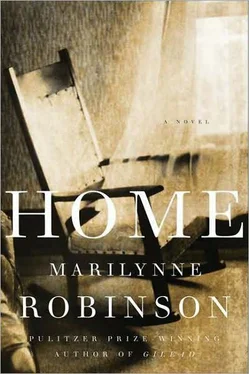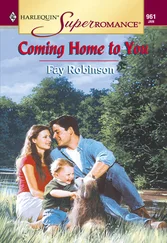Well, the clerk told her, the Philco would be delivered that afternoon, and if the Reverend decided to keep it, an antenna would be installed on the roof whenever he gave the word. The owner reassured her on precisely these same points. People had always been eager to accommodate her father, and to give even ordinary transactions like this one the aspect of exceptional kindness. So she was obliged to answer every question and to accept every assurance twice at least. They told her that many of the older folks find television a great comfort. They agreed that the baseball season was shaping up. And she was obliged to hear a little gossip.
Jack had stood a long time with his arms full of groceries when she could finally leave the store. “So that worked out,” he said. “Good. Thank you.” He let her take a bottle of milk to make the bag less awkward, and they walked home.
Jack set the television on a lamp table in the parlor. He plugged it in, turned it on, and moved the antenna around one way and another until a passable image presented itself. Their father came in and sat down in an armchair Jack had turned and pushed into place in front of the set.
“So here it is,” the old man said. “We’re very modern now.” He watched without comment a woman in high heels running back and forth across a stage carrying eggs in a teaspoon while a gigantic clock ticked.
Glory said, “The news will be on soon, Papa.”
“Well, yes, I was about to say there isn’t much to this. But you can hear people laughing. I hope there’s money involved. To get a grown woman to act like that.”
The phone rang and Jack came into the kitchen while she answered it, but it was Luke, so he went back to watch the beginning of the news. He was standing in the middle of the room with his hands on his hips. On the screen white police with riot sticks were pushing and dragging black demonstrators. There were dogs.
His father said, “There’s no reason to let that sort of trouble upset you. In six months nobody will remember one thing about it.”
Jack said, “Some people will probably remember it.”
“No. It wasn’t so long ago that everybody was talking about Senator McCarthy. Watching those fellows argue. It’s television that makes things seem important, whether they are or not. Now you never hear a word about Senator McCarthy.”
Jack said, “Well, that’s important, isn’t it?”
“I can’t disagree. I don’t know. I never admired him.”
Police were pushing the black crowd back with dogs, turning fire hoses on them. Jack said, “Jesus Christ!”
His father shifted in his chair. “That kind of language has never been acceptable in this house.”
Jack said, “I—” as if he had been about to say more. But he stopped himself. “Sorry.”
On the screen an official was declaring his intention to enforce the letter of the law. Jack said something under his breath, then glanced at his father.
The old man said, “I do believe it is necessary to enforce the law. The Apostle Paul says we should do everything ‘decently and in order.’ You can’t have people running around the streets like that.”
Jack snapped off the TV. He said, “Sorry. I was just kind of—”
“No need to be sorry, Jack. Young people want the world to change and old people want it to stay the same. And who is to judge between thee and me? We just have to forgive each other.” After a moment he said, “But I hope we don’t have to argue. I don’t like the shouting and I don’t like the swearing. Especially the swearing.” He said, “I know those words don’t mean much to you. They do to me. You could respect that.”
“Yes, sir.” Jack stepped away and felt in his shirt pocket for his pack of cigarettes. His hand trembled. He stopped in the doorway and looked back at his father. The old man sat bowed in his chair, his head forward, the deeply cleft nape of his neck exposed under the thin tousle of hair. He might have been praying, but anyone who did not know him well could think he was simply sad and frail. Jack glanced at Glory. “Did I do that to him?” The scar under his eye was white.
“He’s tired.”
He said, “I shouldn’t have said what I did. But things keep getting worse—”
“He’ll be all right when he’s had some sleep.”
“No. No, I mean the dogs. The fire hoses. Fire hoses. There were kids —” He gave her that distant, appraising look, as if to see the effect of trusting her so far.
“Are you thinking of going back to St. Louis? None of that will be a problem for you if you stay here.”
He laughed. “Oh, Glory, it’s a problem. Believe me. It’s a problem.”
He went upstairs, came down again for a book, brought the book back down in half an hour and put it by the radio. He stood in the porch and smoked, and then he said, “Back in a while,” and left. She kept his supper warm. Her father could not be persuaded to take even a bite of his. “I have never heard him speak that way. No, he was always respectful, as far as that goes. Here in my house. I may have made too much of it. No, it’s something I don’t feel I should tolerate.”
When Jack came in, his father was still at the table, brooding over his cold soup. “Don’t bother,” he said, when Jack offered to help him with his chair. “Glory is here. She will look after me.”
When she came back into the kitchen, Jack was standing in the porch. He said, “It’s nice out here. Dark.”
She went out and stood beside him.
He cleared his throat. “Can I ask you something?”
“Probably.”
“It’s nothing personal.”
“All right.”
“Say you do something terrible. And it’s done. And you can’t change it. Then how do you live the rest of your life? What do you say about it?”
“Do I know what terrible thing we’re talking about?”
He nodded. “Yes. You do know. When I was out walking the other day I took a wrong turn and ended up at the cemetery.” He said, “I’d forgotten she was there.”
“She was part of the family.”
He nodded.
“All I can tell you is what Papa would say. He’d say repent, and then — you can put it aside, more or less, and go on. You’ve probably heard him say that as often as I have.”
“More often.” Then he said, “Regret doesn’t count, I suppose.”
“I don’t claim to know about these things. It seems to me that regret should count. Whatever that means.”
“But if you just found out about it, no matter whether I regretted or repented — what would you think of me?”
“What can I say? You’re my brother. If I were someone else, and I knew you and thought you were all right, then that would matter more to me than something that happened so many years ago.”
“Even though I had never told you about it. And I should have told you.”
“I think so.”
He nodded. “You’re not being kind.”
“I don’t really know.”
“Well, I might have a chance. Things could work out.” He said, “It will be bad at best. A miserable thing to have to hope for. Pain all around. Ah, little sister. It’s no wonder I can’t sleep.”
The television set stayed on the lamp table. Jack turned it on for the morning, noon, and evening news, and turned it off again if there was nothing about Montgomery. His father ignored it completely.
FOR YEARS, BEFORE GLORY CAME HOME AND WITHOUT regard to the occasional pious attentions of family returned for holidays, Lila had gone up to the cemetery to look after the Boughtons as well as the Ameses. Glory noticed a special tenderness toward the first Mrs. Ames and her child, who had passed from the world together so long ago, and toward the other little girl about whom, in that gentle, worldly way of hers, Lila seemed neither to know nor to wonder. Snowdrops, crocuses, jonquils. Jack might have seen late tulips or creeping phlox. That was probably good, Glory thought. She would tell him, if he asked, that the flowers were Lila’s, so he would not think they meant endless mourning so much as the wish to somehow compensate a child for missing seventy springs, or perhaps to offer delight to her perpetual childhood — she wondered if Lila would ever tell her what all the flowers meant, except kindness, and love of the lives, past and present, into which she had chosen to adopt herself, as if finally at home. She would probably smile and say, The soil is better there, or That spot gets more sun. But Glory was pleased that Jack must first have thought how pretty the place was, and then have looked to see who was cared for so lovingly. It must have been some comfort to him, though she knew no comfort was ever sufficient.
Читать дальше












